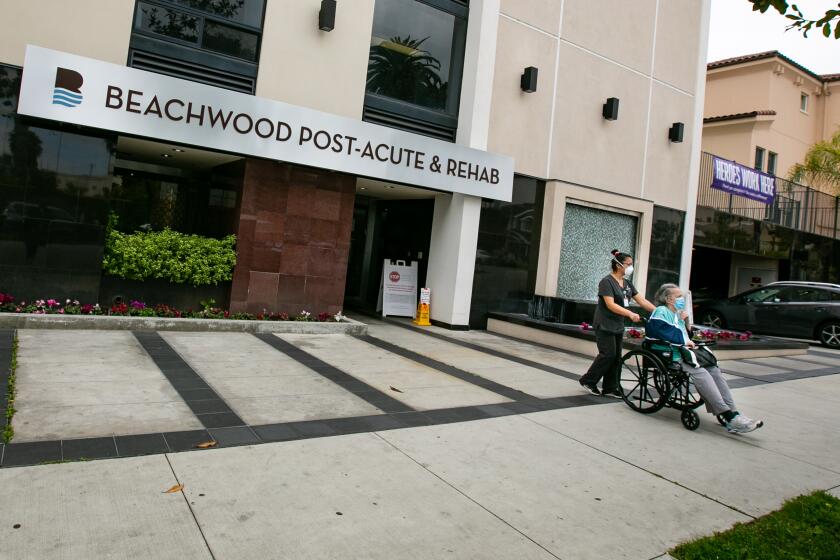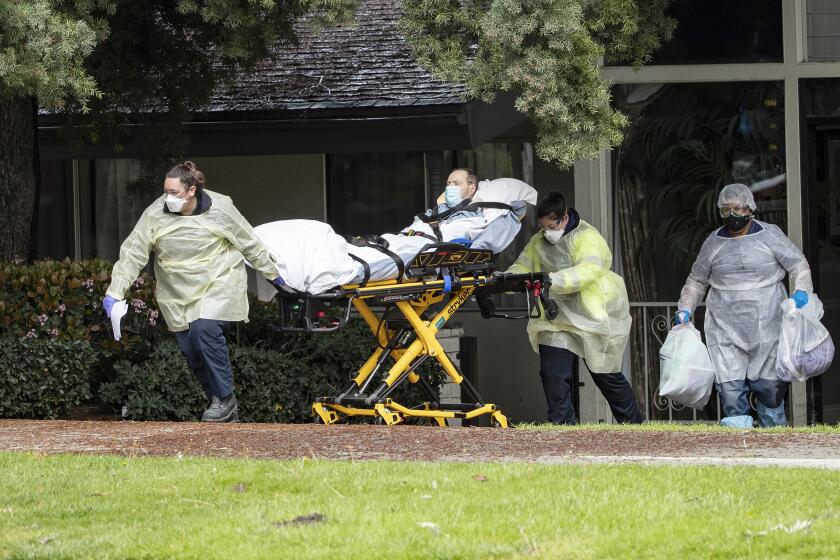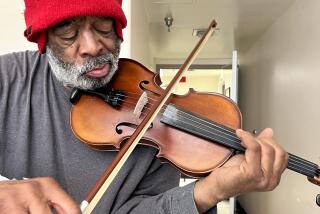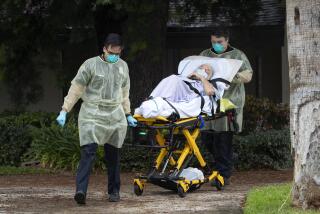This nursing home had California’s deadliest coronavirus outbreak. ‘We weren’t prepared’
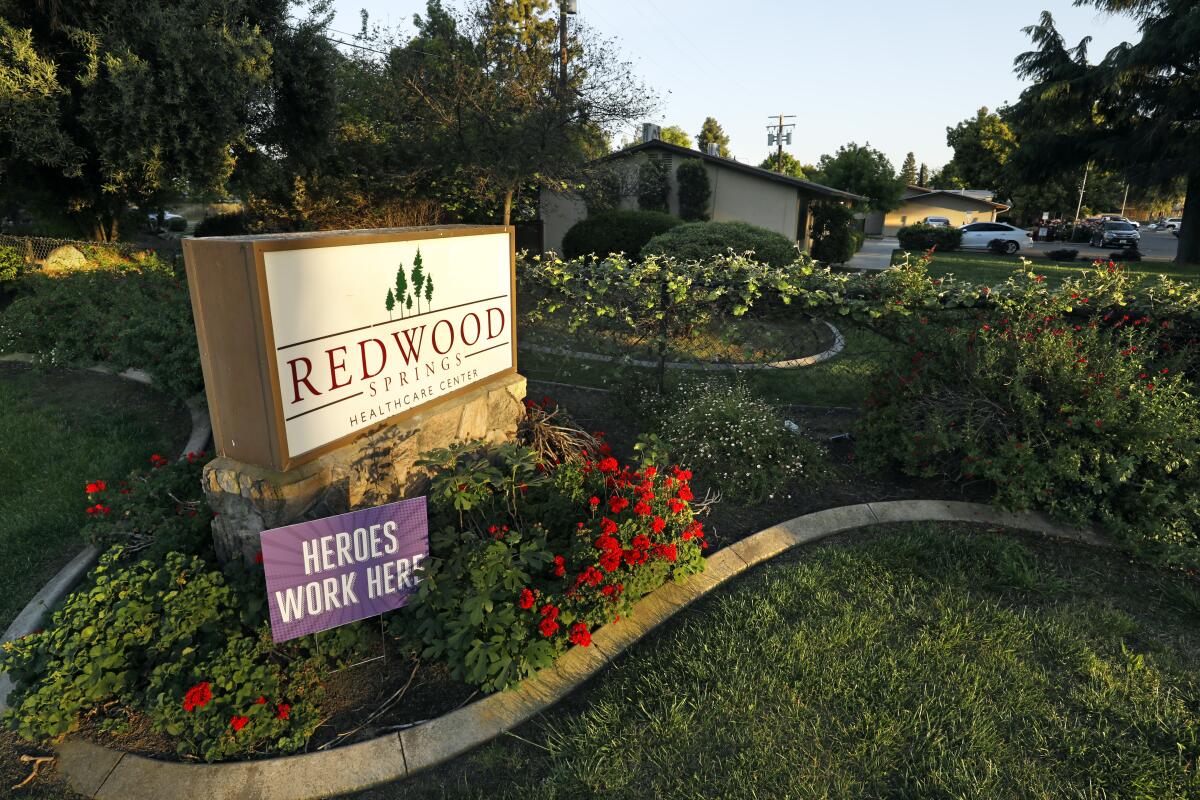
- Share via
The toll is grim at the Redwood Springs Healthcare Center in Visalia, site of California’s deadliest coronavirus outbreak in a nursing home. As of Thursday, 115 residents had tested positive for COVID-19, 61 staff were infected and 26 residents were dead.
At Huntington Valley Healthcare Center in Orange County, 64 patients and 36 staff were ill. Six had died.
At Canyon Springs Post-Acute in Santa Clara County, 69 patients and 30 staff had tested positive, and six residents are dead.
“We weren’t prepared,” said a Redwood Springs nurse who has tested positive. “We lost control of the situation because we weren’t talking about it.”
All three facilities share the same parent company: Plum Healthcare Group, a California entity that controls about 50 skilled nursing facilities in the state.
Plum declined to comment on specifics of the outbreak, other than to say it maintains high standards and has been “meticulous” with infection control, including adding new protocols in March.
“The safety and well-being of our clients and their efforts to care as well as protect patients and caretakers are our highest priorities during this national emergency,” said Plum spokesman David Oates in an emailed statement.
The coronavirus outbreaks have highlighted problems in the state’s nursing home industry: Corporate chains with complex ownership structures, overworked and underpaid employees and a mixed record of complying with infection control requirements, such as workers washing their hands.
Patient advocates say operators may create conditions where infections can quickly spread undetected, with few repercussions because of infrequent state inspections. Of the 192 skilled nursing facilities with outbreaks in California, a Los Angeles Times review of records found at least 13 connected to Plum, accounting for at least 500 cases of COVID-19 and 43 deaths. Other chains also have multiple outbreaks.
CHART: Plum Healthcare facilities with COVID-19 Cases
Nationwide, about 380,000 people in skilled nursing and assisted living facilities die each year from infections, according to the Centers for Disease Control and Prevention.
“Nursing homes would like the public to think this just happened to them, but it didn’t,” said UC San Francisco professor emeritus Charlene Harrington, who studies skilled nursing facilities. “The chains were bad to begin with, and then they were just not prepared for this pandemic.”
The nursing home industry once comprised small operators, locally owned and managed, and often nonprofit. But the industry has morphed into a network of sophisticated chains, with a strong lobbying presence in Sacramento and Washington, D.C. For weeks, the industry has been pressuring Gov. Gavin Newsom to shield them from potential liability, arguing they could be forced to close under a wave of lawsuits, taking away beds needed to relieve pressure on hospitals.
These chains are often owned by investors who obscure their roles through limited liability companies, or LLCs, and amass dozens of properties that draw hundreds of millions in Medicare and Medicaid funds. The industry brings in more than $10 billion in annual revenue in California, mostly from state and federal government payments for about 119,000 beds in about 1,200 facilities.
89% of skilled nursing facilities with coronavirus were recently cited for infection control problems, a Times analysis found.
Harrington said her own research and that of others has found that facilities owned by for-profit chains have lower staffing and more regulatory problems than nonprofits or state-run facilities — often including lapses in basic hygiene. Nearly 90% of California’s nursing homes are privately owned, and in a 2015 study, Harrington found that about 75% of California facilities were owned by chains — one of the highest percentages of any state.
Industry officials say there are benefits to chain operation, including better management, the ability to lower costs and higher industry standards. However, they contend, in the face of the fast-moving coronavirus pandemic, little could be done to mitigate its effects on an elderly and vulnerable population.
“It’s really beyond the worst-case scenarios that I think anyone could reasonably prepare for,” said Mark Parkinson, president and chief executive of the American Health Care Assn. and the National Center for Assisted Living, an industry trade group.
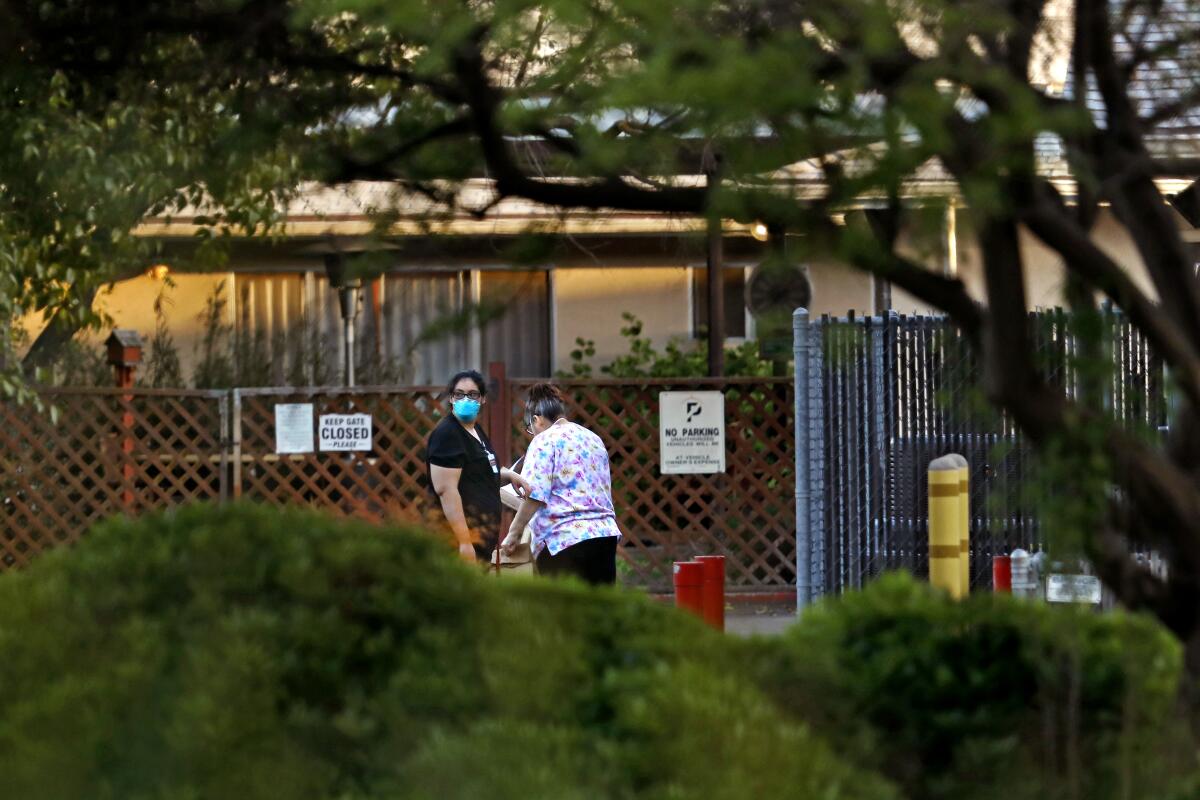
Overall, at least 663 residents and 11 staff at California nursing homes have died from COVID-19 — about 31 percent of the deaths in the state — according to health officials, though a Los Angeles Times review has found multiple errors in state data. Thursday, the state reported that nearly 2,700 staff members and 4,700 residents have tested positive for the coronavirus in skilled nursing facilities.
A 2018 state audit found that California “has not adequately addressed ongoing deficiencies related to the quality of care that nursing facilities provide,” and that the California Department of Public Health, charged with inspecting facilities and enforcing regulations, “in particular has not fulfilled many of its oversight responsibilities,” including timely inspections.
Tony Chicotel, staff attorney for California Advocates for Nursing Home Reform, said the main finding of the audit “was DPH was terrible at their job, which was no surprise to anybody.”
Kate Folmar, spokeswoman for the California Department of Public Health, said via email that the state and the Newsom administration have “accelerated efforts to improve nursing home oversight and deliver quality care to the thousands of Californians who need skilled nursing.”
The department declined to say how far behind it remained on inspections of skilled nursing facilities. Spokesperson Suanne Buggy said in an email Thursday that last year the department “self-identified a backlog of complaints” for all types of facilities it regulates that currently is at about 17,000, and it had created a plan to reduce the backlog by 2021. Non-emergency inspections are on hold while resources are diverted to the coronavirus crisis.
Parkinson, head of the industry trade group, said the current outbreaks have been worsened in part by slow government response in helping facilities secure protective gear like masks, and in ensuring that testing was widely available for staff and patients.
“If you don’t have masks, it’s very hard to keep it from spreading,” he said. “If you don’t have tests, there is no way to know who has it.”
But Harrington, Chicotel and others said they believed the greater problem was a lack of enforcement, especially around staffing — an issue that predates the novel coronavirus.
In 2018, the state legislature raised minimum staffing requirements at skilled nursing facilities, requiring that each patient receive at least 3.5 hours of direct care per day, an increase from 3.2 hours. But the bill included a system for waiving those rules if facilities had trouble finding certified nursing assistants, or in other limited circumstances.
More than 500 waivers were approved in the 2019-2020 fiscal year, allowing about 40% of the skilled nursing facilities in the state to avoid the rules.
California’s health industry wants the governor to grant nursing homes immunity from civil and criminal legal action related to the coronavirus outbreak.
Advocates say understaffing, combined with pay that is often little higher than minimum wage, means the certified nursing assistants who provide the bulk of daily care often have to work multiple jobs to make ends meet, and can spend their days rushing from patient to patient.
“There is no way I can make it on my salary,” said the Redwood Springs nurse, who asked to remain anonymous because she fears retaliation. “My daughter used to work at Claire’s, and she made more money than I did, and I need to keep a license.”
Pressure to attend to a heavy load of patients may lead to lapses in basic hygiene such as washing hands between rooms, pointed out Chicotel, a regulatory breach that is common but carries light penalties. It also means those working multiple jobs may have inadvertently carried the virus with them from workplace to workplace.
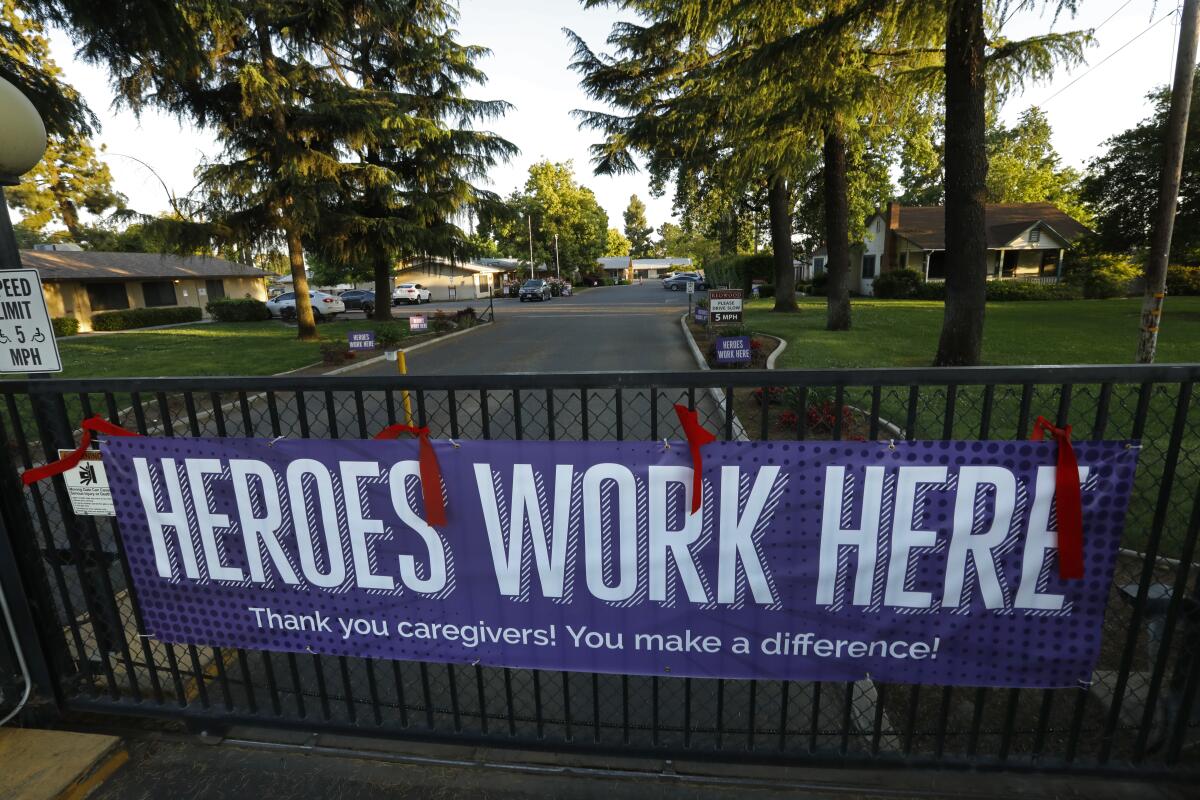
The Redwood Springs nurse tested positive for COVID-19 a few weeks ago and believes she may have contracted it from a worker who came from an infected facility.
“It’s not an accident that these chains have [the virus], because they are the ones with the lowest staffing and the worst quality,” Harrington said.
Industry critics said one problem they see with chain operations is that ownership is often obscured by layers of LLCs, making it difficult for consumers to know who they are dealing with and shielding owners from liability.
Sometimes, related companies are created to provide extra revenue streams for owners, who set up separate businesses to sell to the facility goods or services, such as linens, consulting or human resources services. Many nursing homes also rent their buildings from separate companies controlled by the same owners or close relatives.
Plum, for example, holds each of its facilities as independent companies that share botanical names — Spruce Holdings, Douglas Fir Holdings — with Plum Chief Financial Officer Naveed Hakim listed as the manager in many. Recently, Plum received $420 million in refinancing for 26 properties through the U.S. Department of Housing and Urban Development.
The governor has described the next phase of his stay-at-home order to prevent the spread of coronavirus as allowing some lower-risk businesses to reopen in communities across California, including retail locations, manufacturing sites and small businesses.
But Oates, the Plum spokesman, says the company does not run skilled nursing facilities, despite state and federal oversight that considers it the parent company.
“Plum Healthcare doesn’t own any of the facilities but is contracted by the licensed owner of each entity to perform clinical and administrative services,” Oates said via email. “In this regard, we support our clients’ efforts to implement their clinical care, infection control and safety protocols.”
The state audit examined Plum and two other large California chains — Brius Management Co. and Longwood Management Corp. — and found they had combined net income that grew from less than $10 million in 2006 to between $35 million and $54 million by 2015 as the three companies expanded.
Those companies also paid between $37 million and $65 million each to related companies that shared at least some ownership from 2007 through 2015, the audit found.
Chicotel said he believes that in the current crisis, the state needs to do more to ensure that facilities with outbreaks are acting in the best interests of patients.
He points out that in recent weeks, staffing requirements have been further waived by an executive order from Newsom as facilities struggle with sick and scared workers who are not willing or able to come in. State and county workers and members of the National Guard have been sent to some facilities to help, but shortages remain. Chicotel said waiving minimum staffing requirements now reduced the ability to put in the extra infection control measures that are needed.
Dr. Michael Wasserman, president of the California Association of Long Term Care Medicine and a former CEO of a for-profit chain, said the state government should require facilities to have a full-time infection control person present during the crisis.
“They need a general in the building who is going to go around and make sure everyone is washing their hands,” Wasserman said.
At the same time that regulations are being pulled back, the industry has asked Newsom to sign an executive order waiving much of their liability around coronavirus, similar to waivers other states have already put in place. Though Newsom has not yet signed such an order, advocates are troubled by the idea that there ultimately may be little accountability for how skilled nursing facilities handled outbreaks.
Toby Edelman, senior policy attorney for the Washington, D.C.-based Center for Medicare Advocacy, said she believes the liability reductions represent the industry taking advantage of the crisis to protect themselves from a problem of their own making.
More to Read
Sign up for Essential California
The most important California stories and recommendations in your inbox every morning.
You may occasionally receive promotional content from the Los Angeles Times.
